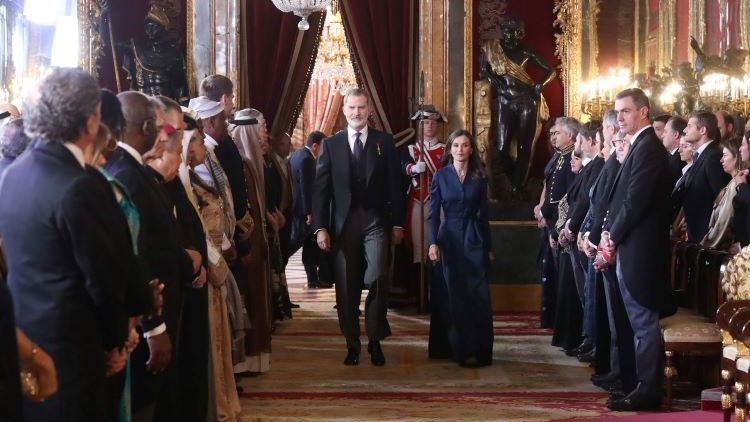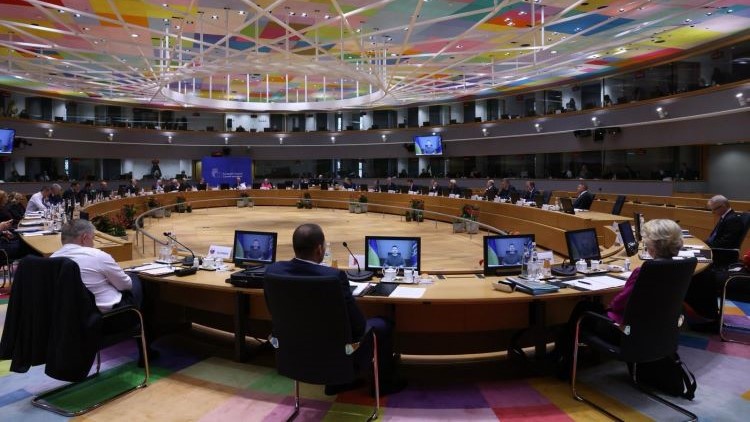Luis Ayllón
His Majesty the King advocated yesterday for the establishment of “a lasting ceasefire” in the Gaza Strip, during the speech she gave at the traditional reception to the Diplomatic Corps accredited in Spain.
The event was held at the Royal Palace, with the attendance of the President of the Government, Pedro Sánchez; and the Minister of Foreign Affairs, José Manuel Albares. The Kings greeted each of the diplomatic representatives, and then, after a few words from the Nuncio of His Holiness, Monsignor Bernardito Auza, as dean of the Diplomatic Corps, Don Felipe gave a speech in which he recognized that we find ourselves in an international context ” very complicated”.
His first words were for the war in Gaza and, after “strongly” condemning the “execrable terrorist attack” that Israel suffered on October 7, he pointed out that “the hostages must be immediately released.” He then added that “humanitarian access must be facilitated as much as possible to care for the Palestinian population of Gaza and establish a lasting ceasefire.”
As he has done on other occasions, the Monarch stressed that Spain has been defending the two-state solution – Israel and Palestine – “with mutual security guarantees, full independence and recognized borders.”
Among the ambassadors were that of Israel, Rebeca Radian-Gordon, who recently returned to Spain, after having been called for consultations by her Government in protest against some critical statements by Pedro Sánchez about Israeli action in Gaza; and the head of the Palestinian Mission, Husni Abdel Wahed, who over his suit wore the traditional kufiya, a symbol of Palestinian resistance.
Attendance of the Ukrainian ambassador, absence of the Russian one
Likewise, the King highlighted that it will be two years since the invasion of Ukraine by Russia, which he described as “unjustified and unjustifiable” and assured that Spain will continue working with its European partners and considering that the peace formula proposed by the Ukrainian President Volodymyr Zelensky is a solid basis for achieving that peace.
The King’s words were listened to attentively by the Ukrainian ambassador, Sergei Pohoreltsev, but not by the Russian, Yuri Klimenko, who, after presenting his Letters of Credence in April of last year, was invited like all the accredited ambassadors, but Finally, he has not attended the reception nor has any member of his Embassy.
Referring to the conflicts in Gaza and Ukraine and those in other regions such as the Sahel, the King pointed out that it is necessary “to continue advocating for the unwavering defense of the United Nations Charter and International Law, including International Humanitarian Law.”
There was, however, in the Monarch’s speech no direct reference to the situation in the Red Sea due to the attacks by the Houthi militias on the ships sailing through that area, nor to the operation that the United States wants to implement. . underway, and to which Spain did not join.
In any case, Don Felipe described as “excellent” the state of relations with the United States, whose ambassador was present at the event.
The Monarch also said that Spain “will continue to participate in deterrence and collective defense on the eastern flank, with a new detachment in Slovakia, assuming leadership of the NATO multinational brigade in the country and with another new contingent in Romania.
Latin America, Africa and Asia
As is customary in this congratulatory speech for the year to the ambassadors, the King reviewed the different geographical areas considered of special interest for Spain. Thus, in the case of Ibero-America, he said that our country will continue working to complete the network of agreements that unite the EU with Latin America. At the same time, he highlighted that Spanish is one of the greatest assets that both Spain and the Spanish-speaking community have and assured that “the Crown has a permanent commitment to the dissemination of Spanish internationally.”
He indicated that Africa is also a priority for Spanish foreign policy, which – he said – maintains “a close, constructive and forward-looking approach” especially with the countries of the Sahel and West Africa and is fully “committed to their stability and prosperity”.
Regarding Asia, he stated that “it is consolidated as a new priority scenario for our foreign policy, due to its great economic importance and geopolitical relevance,” and cited countries such as India, Japan and China, whose ambassador, Yao Jing, could not be there. present at the ceremony, because he has still been able to present Letters of Credence before the King.
For the same reason, the Algerian ambassador, Abdelfetá Daghmun, did not attend. He recently arrived in Spain, nineteen months after the Government of his country decided to withdraw the ambassador who was then in Madrid, in protest at the turn taken by the Spanish government in relation to Western Sahara. His representation was held by the Chargé d’Affaires.
Nor was there any allusion from the Monarch to the Sahara dispute or to Morocco, whose ambassador, Karima Benyaich, was present. However, Don Felipe did not miss the opportunity to address the drama of immigration, a good part of which comes from the coasts of North Africa.
In this sense, the King stressed that immigration is a complex challenge that Europe faces, “for which solutions can only be found – he said – from a comprehensive and horizontal approach of cooperation.” “Constant dialogue between the countries of origin or transit and those of destination is essential,” he stated, “if we want to achieve the common objective of guaranteeing orderly, regular and safe migratory flows.”
Don Felipe also emphasized Spain’s commitment to the fight against terrorism, and after remembering that in March it will be 20 years since the jihadist attacks in Madrid, he stated that “the victims of terrorism must occupy a central place in the policies of the State.” He added that Spain will work to hold a new world Congress in our country, which gives continuity to the one held in New York in 2022.
Before concluding, the King had a few words of praise for the former president of the European Commission Jacques Delors, who died on December 27 and for whom an official day of mourning was declared yesterday in Spain. After pointing out that Delors “was an example of the best Europe, that of enlargement, of freedom of movement, of the single market, of territorial cohesion,” Don Felipe did not hesitate to affirm that he was “a friend of Spain who we will never forget”.







